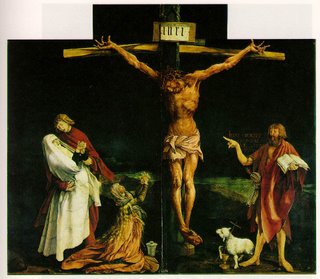
The wages of sin is death. The death on the Cross now represents this wage. Death is the reward and result of my sin. Every sin leads to death. But who will see the connection? Who has any idea how much of what is positive is destroyed in men through sin? ...
[Stretching out her arms] Now the crown of thorns is put in place; now the nails are hammered in, and with every blow sins are hammered into the soul and body of the Lord. The crown is formed from existing sins, those I intend to commit or those I am not finished with. The nails are formed of those of the past, the forgotten ones, those one no longer wishes to acknowledge or remember. [Sighing] Ah, and he made up for it all. For everything, everything. For everyone.
When the nails penetrate, they burst into the body of Christ all at once. Imagine that all the sins of my whole life, even those of mere thought, become present and penetrate into me through my hands and feet. They penetrate through an unimaginiable painful recognition. And the sins of the crown do no penetrate but make their mark. And the more painful it is and the more tired one is, so much the more still follows after. Don't you see it?
This monstrous shame. Now one has to receive for every sin the wage that is called death. Imagine someone who would want to make reparation in his living flesh for everything, for example, for every murder. Every murderous intention as well. He would become mincemeat. Even taking on just one small category of sin would already be totally unthinkable. But the Lord bears all sins and, so, all the kinds of death one could think of. And he bears it not as victim, as blows from without; he does not merely offer his body but hands over his whole being. He bears every sin from within as if he himself had committed it, with all its shame. A shame that now does not admit of repentance. Repentance and confession belong together in a unity that originates from the Cross, beyond the Cross. On the Cross, the Lord only reaches the insight into the heinousness of sin.
This Son who has handed over his divinity, his whole spirit to the Father, in order to be only man, is that man who lived without experiencing sin otherwise than in others. But because he now wants to be only the Son of Man, the exemplar of man, he has to experience every sin in the same way men would if ...
There is nothing ever so intimate that does not now undergo profanation. Every possible form of love is wounded in every possible way. And the Son has here to discover himself with his pure soul: in the midst of the most secret malice. As if someone finds himself doing what he had sworn to himself he would never do. The Son feels the same abhorrence for every sin, but he does not repel it as something foreign; he allows it to settle on himself. There is no way of deadening the impact. One sin more or less does not matter to a sinner; he would not mind taking on one for another person occasionally. His conscience is blunted. But the Lord feels every sin with his whole soul and body. In his death he dies all deaths. He leaves no sin behind as something finished with. Each one causes his death. The sin that is intended, the sin that is willed, the sin committed, everything always up to the limit where repentance begins, up to total abhorrence. And by going the way of terrible, perfect recognition (by means of his purity) he opens for us the way to repentance and confession. He himself is now unable to confess; he has no time left. Everything clashes so monstrously together that in grasping one thing, he always grasps everything else with it.
And all this in obedience! What can that mean: "Into your hands I commend my spirit"? ... There are still more parts that have to die ... I thirst. ... Adieu.
No comments:
Post a Comment